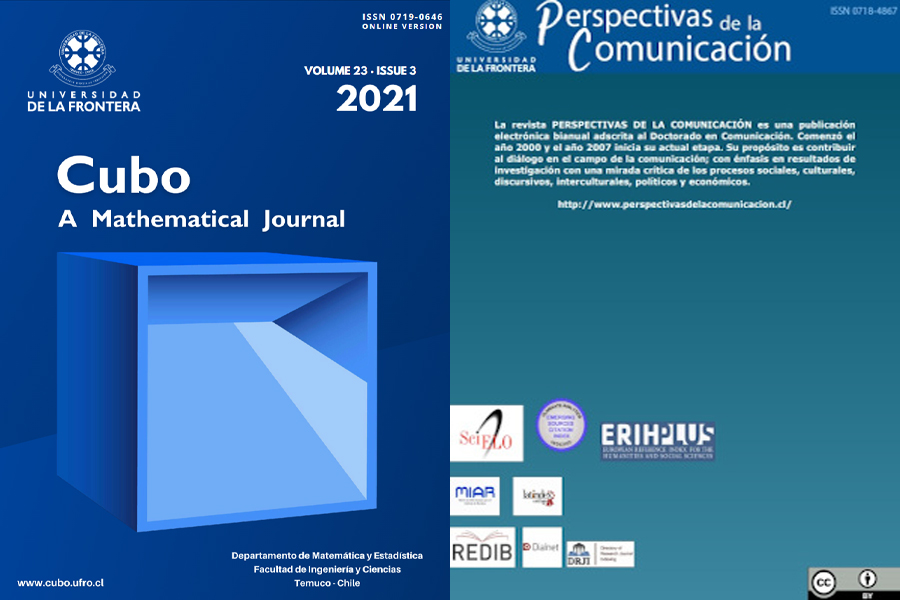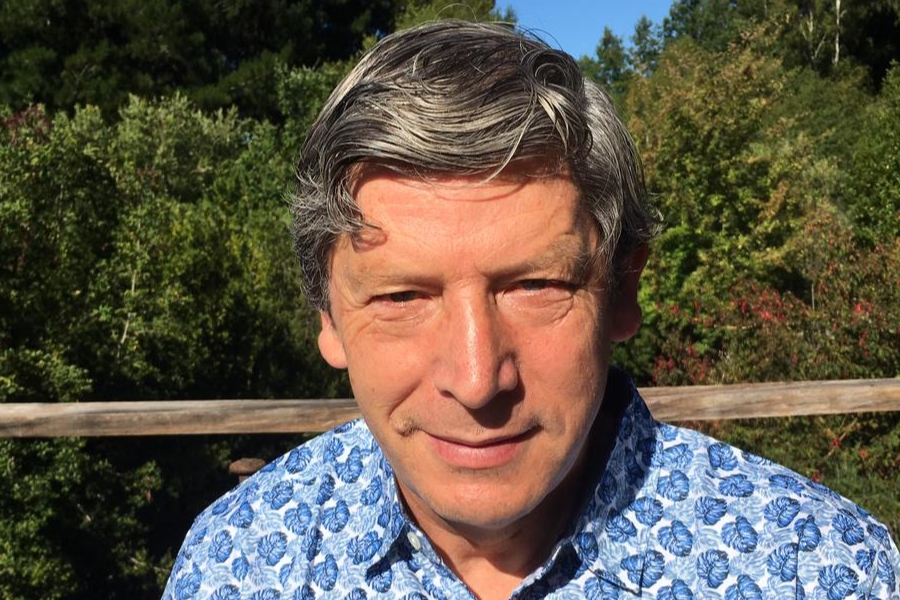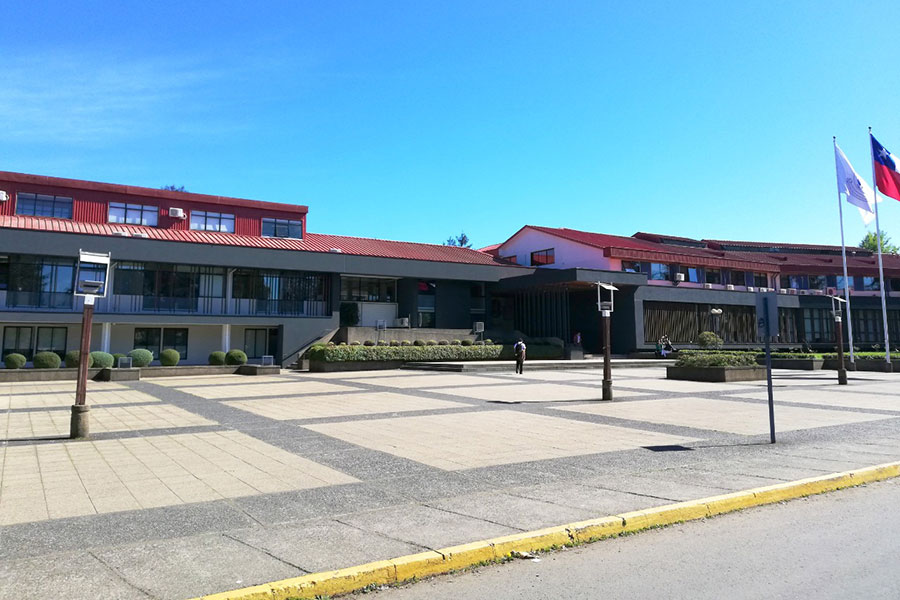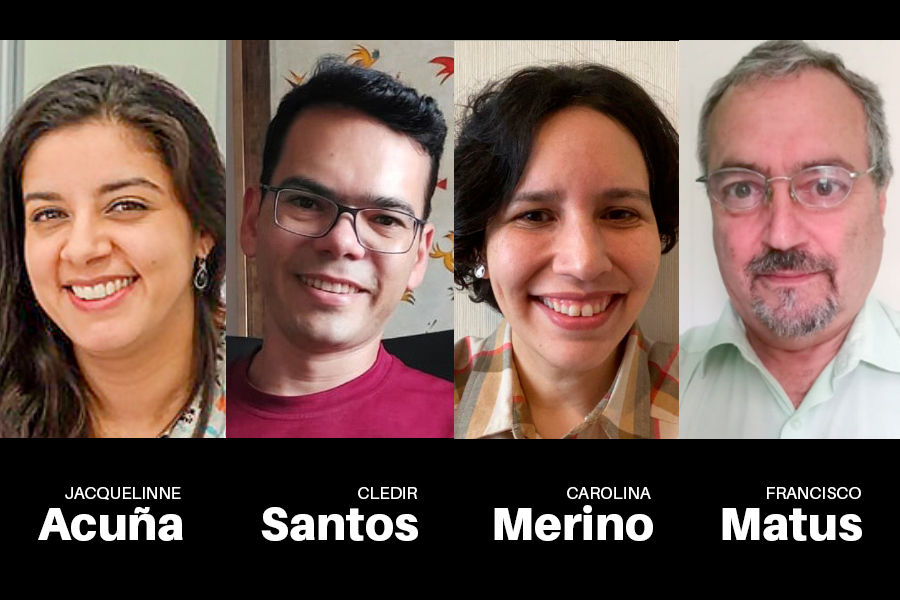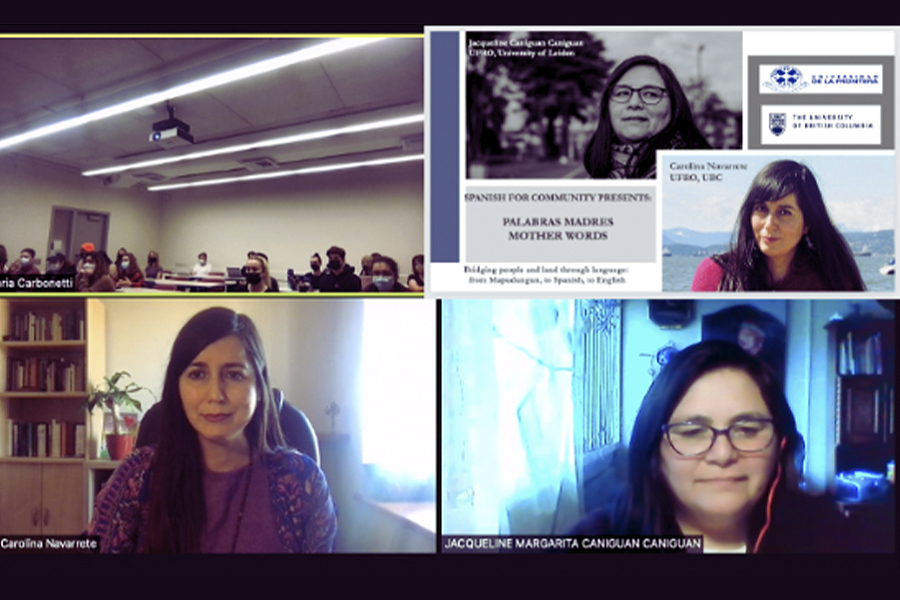|
This is the second time that both journals achieved to get the same fund, which aims at optimizing the editorial process and improving the international visibility of each one of them. In this call, the project was in first place at the national level among the selected projects. |
Two journals of the Universidad de La Frontera (UFRO) got ANID (“Chilean National Agency for Research and Development”) project funds approved that will allow them to optimize their processes and to aim for national and international positioning. These journals are “Cubo, A Mathematical Journal”, edited by the Department of Mathematics and Statistics since 1985, and “Perspectivas de la Comunicación” (Perspectives of Communications), which started in the year 2000 under the wing of the Doctoral Program in Communications. It has not been easy for these open access journals, but thanks to the constant hard work, Cubo achieved to be part of prestigious databases such as Scopus, DOAJ and SciELO-Chile, and Perspectivas de la Comunicación achieved to be part of SciELO in the Emerging Sources Citation Index of Web of Science. “It is a complex task to maintain a journal that comes from a region in a country that is not that known for its science and very centralized, and moreover in a field such as mathematics, which requires a high technical level in the process of knowledge generation. In fact, there are only two mathematical journals in Chile,” explained Dr. Mauricio Godoy, the editor of the Journal Cubo. Together with the industrial engineer Ignacio Castillo, he began to digitize all previous editions in order to improve the level of the publications and to seek funding to strengthen the journal. In this context, they got a project fund approved in 2016, which allowed them to develop an online portal for academic journals UFRO, among others. This first project was essential for the journal to emerge again. It was not only accepted in Scopus, but also authors from different countries started to publish in it, giving it more visibility at the international level. Last year, the journal received more than 250 manuscripts from France, Italy, Germany, Japan, Mexico, USA, India, Saudi Arabia, China, South Korea, etc., but it publishes only about 30 articles a year. “We reached a level where we need to improve and optimize the editorial process in order to improve the productivity and efficiency of the journal. Those are some of our main challenges regarding this project,” said Ignacio Castillo, who is in charge of this process. GOALS: INDEXED IN WOS AND LEADER IN LATIN AMERICA This new fund will allow carrying out several activities to achieve these new goals, such as to advance to the category of emerging journals in the Web of Science (WoS), what implies to meet strict editorial, scientific and management parameters. But the work towards this aim has already begun, with a data analysis, in which also some undergraduate students are participating. At the same time, the editors will make use of different consultancy services for the editorial process, as well as of technological platforms to facilitate the reviews and to reach a certain branding and brand positioning at the national and international level. In addition, this new project will allow to update the journals’ websites and to add new features. One of the important proposed ideas is the establishment of a Network for Latin American Mathematical Journals, considering the high level of the researchers and the low number of publishing houses. “There are very few Mathematical Journals in Latin America that are indexed in WoS and we want to understand the reason. There are top-level mathematicians in Latin America, but they prefer to publish in other countries, since the Latin American Journals are not very well-positioned at the international level, but if we had a network, we could help each other to reach another level,” concluded Dr. Godoy. REACH SCOPUS AND INCREASED INTERNATIONALIZATION The objectives of the journal “Perspectivas de la Comunicación” within this project are equally challenging. There are five communication-related journals in Chile. Two of them are indexed in SciELO and one in Scopus. “Perspectivas de la Comunicación” is the second most important journal in its field in Chile and sets an example in Ibero-America. “With the help of the previous ANID project funds we received, we managed to be part of SciELO since 2019. Now, we want to be Scopus indexed, but we have to meet certain criteria for that, such as a certain percentage of articles in English. That is one of our main focuses at the moment,” explained Dr. Carlos del Valle, the director of the journal. Therefore, the journal will publish at least two bilingual issues and although there are many international collaborators, the challenge is to attract English speaking reviewers and authors. The new project will also allow making use of consultancy services in order to find optimization strategies with IT-support for the management processes, as well as to strengthen the collaboration networks and to ensure greater international visibility. The journal “Perspectivas de la Comunicación” publishes two issues a year, but since a couple of years, it started to make use of the system recommended by the international indices. “We publish the articles according to their evaluations, thus the authors can access their publications, a procedure that adds another dynamic to the process,” explained Dr. Del Valle, adding that, since 2007, the journal is published online only. This is because of the sustainability commitments of the university. It is also worth mentioning that UFRO has eleven scientific journals at the moment, of which two are indexed in WoS, three in Scopus and four in SciELO. PROJECT DETAILS Title: “Optimization of the editorial process and improvement of the international visibility of the journals CUBO, A Mathematical Journal and Perspectivas de la Comunicación” (“Optimización del proceso editorial y mejoramiento en la visibilidad internacional de las revistas CUBO, A Mathematical Journal y Perspectivas de la Comunicación”) Code: FP210007
Written by: Karimme Riadi Millas
|
|
Dr. Rodolfo Figueroa, the director of the Center for Medical Physics and Engineering of the Universidad de la Frontera, was distinguished as VEBLEO-Fellow, a recognition awarded by international scientific peers for his contribution to innovation. |
The joint work of a group of physicists, engineers and other professionals related to the field of health allows the Universidad de La Frontera (UFRO) to be a leader in the development of innovative solutions and to influence the medical field at the regional and national level, especially with regard to cancer treatment. The research work of this group has been led by Dr. Rodolfo Figueroa Saavedra, first through the Master in Medical Physics and then through the Center for Medical Physics and Engineering (CeFIM). The investigation of new treatment methods with radiation therapy and new medical x-ray methodologies, simultaneous treatments with nanoparticles to fight cancer and to address dental applications, and patents of inventions are just some of the major achievements that mark Dr. Figueroa's career. Therefore, his international peers recently recognized these contributions, distinguishing him as “VEBLEO-Fellow”. VEBLEO is a renowned multi-platform for scientific networking, which, through the organization of conferences, brings together researchers, industries, start-ups and investors, with the specific intention of promoting growth and innovation thus bringing the best current trendsetters together. Dr. Figueroa explains: “This distinction, which I really appreciate and which is an honor, is not only for me, but also for the Center for Medical Physics and Engineering; as well as for the Department of Physical Sciences, the Faculty of Engineering and Science and the whole Universidad de La Frontera. I really want to point out that this is the result of our constant research work as a team in the field of cancer, which we have been carrying out for more than a decade already.” That team consist of Dr. Mauro Valente, Dr. Fernando Leyton, Dr. Francisco Malano, MSc. Jaime Guarda, Jorge Leiva, MSc. José Velásquez and Bryan Cassanelli. After a meticulous process of nomination and selection, which included a review of his academic career and finished with a dissertation about one of his main research fields, “Development of a new technique that uses nanoparticles and convergent ionizing radiation devices in the diagnosis, treatment and theranostics of cancer”, Dr. Rodolfo Figueroa Saavedra was recognized as VEBLEO-Fellow by a committee of well-known scientists and researchers from different countries. Written by: Daphne Bormann Parada |
|
The Universidad de La Frontera starts this year with 36 new FONDECYT (“Chilean National Fund for Scientific and Technological Development”) Projects (14 Regular, 10 Initiation in Research, and 12 Post-Doctoral Projects). |
“This result confirms the great performance of our researchers in a system of increasingly competitive public competitions,” commented the Vice-Rector for Research and Graduate Studies of the Universidad de La Frontera (UFRO), Dr. Rodrigo Navia Diez, after receiving the good news. “2021 is over and we start this new year with 36 awarded FONDECYT Projects and the commitment to keep encouraging our researchers in order to move forward and to align our work with the current needs and global issues,” he added. The proposal selection process is very strict and includes an analysis of the quality, feasibility and degree of scientific and technological innovation of the project, as well as of the previous productivity of the researcher in charge of the project. The Chilean National Agency for Research and Development (ANID) seeks to promote scientific and technological research in various fields of knowledge with its competitions, and by funding individual research projects of excellence, in order to create knowledge. According to Dr. Carolina Navarrete, the Research Director at UFRO, this important achievement reflects the progress and leadership of the research of excellence produced at UFRO in the fields of science and technology. The awarded projects cover the fields Exact and Natural Sciences (especially mathematics, chemistry and theoretical and experimental physics); Technology and Engineering Sciences (especially engineering); Social Science (especially early childhood education, sociology and psychology); and Humanities (especially linguistics and transdisciplinary and interdisciplinary research). “There is no doubt that these results are the product of a cooperative effort between the Vice-Rectorate for Research and Graduate Studies and the Research Office, which support the academics and researchers of UFRO who conduct cutting-edge research. In this regard, the incentive strategies and permanent support are showing results. But we are also aware that we have to strengthen the work of our researchers even more and that is why we are working hard to promote the research of UFRO through the introduction of new thematic competitions together with other universities in Chile as well as in the rest of the world. We are working on the process of reviewing our policies, because it is important to make progress in research based on the most up-to-date knowledge, having the transformations of our society in mind. It is essential to constantly improve the institutional support strategies for our researchers and we are strongly committed to that, since it is one of our challenges in 2022 and the future,” she added. These are the researchers who will receive funding for their Regular FONDECYT Projects by ANID: Jacqueline Acuña Sobarzo: “Development of intelligent cooperative microbial consortia based on in situ cultivation and their functional complementarity to improve lupine stress tolerance”. Mónica Bravo Sanzana: “Evaluación de una medida multidimensional y multi-informante de Clima Social Escolar y bienestar hedónico y eudaimónico para estudiantes adolescentes en etapa de transición educativa” (Evaluation of a multidimensional and multi-informant measure of Social School Climate and hedonic and eudaimonic well-being for adolescent students in an educational transition stage). Carlos del Valle Rojas: “El proyecto civilizatorio en la industria cultural de América Latina. Fundamentos ideológicos, encuadres mediáticos y estrategias de enemización durante los siglos XIX, XX y XXI. Los casos de Chile, Argentina, Perú y Colombia” (The civilising project in the Latin American culture industry. Ideological foundations, media frames and enemisation strategies during the 19th, 20th and 21st centuries. The cases of Chile, Argentina, Peru and Colombia). Francisco Matus Baeza: “Ferrous wheel coupled to nitrate reduction as a mechanism for nitrogen retention in temperate rainforest soils”. Carolina Merino Guzmán: “Biotic and abiotic oxidation mechanisms of organic matter in humid temperate forest soils in fluctuating redox microsites”. Carlos Muñoz Poblete: “Towards reliable movement identification for dairy cattle based on self-calibration attitude estimate algorithms”. Aldo Olate Vinet: “Fenómenos de cambio de valencia y orden sintáctico en el castellano hablado por bilingüés mapuche/español. Un abordaje desde el contacto lingüístico y la tipología sintáctica” (Valency change and syntactic order phenomena in Spanish spoken by Mapuche/Spanish bilinguals. An approach based on language contact and syntactic typology). Cristián Paz Robles: “Hemisynthesis of Drimane Sesquiterpenoids isolated from Drimys Winteri as modulators of hα7 and hα4β2 nAChR subtypes: searching for specific ligands with neuroprotective activity” Sebastián Reyes Carocca: “Group actions on Riemann surfaces and abelian varieties”. Mauricio Santibáñez Villalobos: “Dosimetry characterization and optimization of the dose enhancement and dose sparing process produced with Gd-nanoparticles infused in tumor by treatments with electronic brachytherapy and Radiotherapy Flattening Filter Free”. Cledir Santos: “Development of a biofungicide from pod extracts of Capsicum Annuum L. to prevent mycotoxigenic fungi in wheat production”. Ítalo Trizano Hermosilla: “Fiabilidad de la medida para datos categóricos con estructuras latentes bifactor: Comparando el nivel de sesgo de diferentes estimadores obtenidos desde la teoría clásica de los test, sus extensiones factoriales y la Teoría de Respuesta a los Ítems” (Measurement reliability for categorical data with bifactor latent structures: Comparing the level of bias of different estimators obtained from classical test theory, its factorial extensions and Item Response Theory). Héctor Young Conejeros: “Model-free predictive control of ac microgrids”.
Written by: Andrea Poblete Pacheco
|
Academic staff of Doctorate in Natural Resource Sciences got four Regular FONDECYT Projects approved
|
The projects of Jacquelinne Acuña, Carolina Merino, Cledir Santos and Francisco Matus, who are part of the agronomy group, will each have a duration of four years. |
Four academic staff members of the Doctorate in Natural Resource Sciences of the Universidad de La Frontera (UFRO) got the funding for their project proposals in the Regular FONDECYT (“Chilean National Fund for Scientific and Technological Development”) Project competition call 2022 approved. This is another step towards the strengthening of the research of the Doctoral Program. With its competition calls and by funding individual research projects of excellence, the Chilean National Agency for Research and Development (ANID) seeks to promote scientific and technological research in various fields of knowledge, and this year, UFRO got 14 new Regular FONDECYT Projects approved in the competitive call 2022. The development of these projects will strengthen the fields of research of the Doctorate in Natural Resource Sciences and directly benefit the human capital trained in this program. “The current results of the FONDECYT competitions show the impact and importance of our doctoral programs, with four approved Post-Doctoral Projects, one Initiation in Research and two Regular FONDECYT Projects of our program´s graduates who have been strengthening the research of our program and our university with their work,” Dr. Quiroz added. DEVELOPMENT OF A BIOFUNGICIDE Dr. Cledir Santos, a researcher of the Faculty of Engineering and Science, is the researcher in charge of the project “Development of a biofungicide from pod extracts of Capsicum annuum L. to prevent mycotoxigenic fungi in wheat production”. This project seeks to develop a biofungicide from pod extracts of Capsicum annuum L. (hot pepper), irradiated with gamma rays to prevent the development of mycotoxigenic fungi in wheat produced under greenhouse and field conditions in the La Araucanía Region in Chile. This project is based on One Health, an approach where a healthy agricultural production environment, free of synthetic pesticides, will lead to a healthy society, with a better quality of life. The researcher will receive an amount of 246.028.000 CLP (ca. 305 thousand USD) to carry out his project in cooperation with his national co-investigators of UFRO: Dr. Rodolfo Figueroa, Dr. Pablo Cornejo, Dr. Marjorie Reyes, and Dr. Antonieta Ruíz; the external national co-investigators: Dr. Patricio Sandaña (Universidad Austral), Dr. Patricio Sandaña (Universidad Austral), Dr. Marjorie Reyes, and Dr. Antonieta Ruíz (Universidad Austral), who are part of the academic staff of the Doctorate in Natural Resource Sciences; the external national co-investigator: Dr. Patricio Sandaña (Universidad Austral de Chile); and the foreign co-investigators: Dr. Paola Battilani (Faculty of Agricultural, Food and Environmental Sciences, Università Cattolica del Sacro Cuore, Italy), Dr. Nelson Lima (Centro de Engenharia Biológica, Universidade do Minho, Portugal), and Dr. Naresh Magan (Cranfield University, Soil and Agrifood Institute, Great Britain). INOCULANT TO IMPROVE TOLERANCE TO WATER SCARCITY IN LUPINE PLANTS Dr. Jacquelinne Acuña, a graduate of the Doctoral Program who is currently working at the Scientific and Technological Bioresource Nucleus (BIOREN-UFRO) is the researcher in charge of the project “Development of intelligent cooperative microbial consortia based on in situ culture and its functional complementarity to improve stress tolerance in lupine plants”. This study will develop in situ cultures in combination with functional methods and metabolic and genomic trials to explore intelligent cooperative microbial consortia (iCMC) and evaluate their ability to improve the water stress tolerance in lupine plants. First, novel in situ cultivation techniques will be used to isolate naturally co-existing microbial consortia. Then, iCMCs will be selected and observed under greenhouse and field conditions, applying them as inoculants to improve the tolerance to water scarcity. It is expected to gain insights into the interactions that occur in response to stress, allowing to improve the resilience of agricultural production in response to droughts. The researcher will receive an amount of 223.200.000 CLP (ca. 276 thousand USD) to carry out her project in cooperation with her co-investigators Dr. Shoko Ueki (Okayama University, Japan); Dr. Lukas Wick (Helmholtz Centre for Environmental Research, Germany); Dr. Qiang Zhang (University of Minnesota, USA) and Dr. Haroldo Salvo (Agriaquaculture Nutritional Genomic Center, Chile). THE NITROGEN CYCLE AND ITS TRANSFORMATION STEPS IN TEMPERATE RAINFOREST SOILS Dr. Francisco Matus, an academic of the Faculty of Engineering and Science, will receive an amount of 220.000.000 CLP (ca. 274 thousand USD) to carry out his project “Ferrous wheel coupled to nitrate reduction as a mechanism for nitrogen retention in temperate rainforest soils”, in cooperation with his co-investigators: Dr. Carolina Merino (UFRO), Dr. Ignacio Jofré (UFRO), Dr. Felipe Aburto (UDEC/Texas University) and Dr. Roberto Godoy (Universidad Austral, Chile). This study seeks to understand the nitrogen cycle and its transformation in temperate rainforest soils (forest of Valdivia, Chile), since the nitrogen availability is usually low and greenhouse gas losses are high in these soils. This can partly be explained by the biological reduction of nitrate to ammonium under anaerobic conditions and by the Ferrous Wheel (FW) hypothesis, which has recently been tested in an experiment with soils from the forests of Valdivia. The FW indicates that soluble iron, which appears to be high in these soils, is able to act on the N-mineral by fixing it as organic nitrogen and preventing this nitrogen from accumulating in the soil and being released into water currents and lost as greenhouse gases. The FW hypothesis will be assessed under field conditions, in soils derived from different parent materials, with different iron and nitrogen levels. 15N stable isotopes will be applied as natural tracers, in order to determine at what rate and how much nitrogen is accumulated in the different organic nitrogen reserves in the soil. The researchers expect to find high levels of nitrogen fixation in organic compounds. This could contribute in the process of carbon sequestration, with important implications for this kind of ecosystems and climate change mitigation. COMPLEMENTARY MECHANISMS OF SOIL ORGANIC MATTER (SOM) OXIDATION AND GREENHOUSE GAS (GHG) EMISSIONS Dr. Carolina Merino, a graduate of the Doctoral program who is currently working at the Scientific and Technological Bioresource Nucleus (BIOREN-UFRO), got her project “Biotic and abiotic oxidation mechanisms of organic matter in humid temperate forest soils in fluctuating redox microsites” approved. She will receive an amount of 220.000.000 CLP (ca. 274 thousand USD) to carry out her project in cooperation with Dr. Francisco Matus (UFRO), Dr. Ignacio Jofré (UFRO), Dr. Felipe Aburto (UDEC/Texas University) and Dr. José Dorner (Universidad Austral, Chile). The main purpose of this project is to study the complementary mechanisms of soil organic matter (SOM) oxidation and greenhouse gas (GHG) emissions in soil microsites, through abiotic (e.g. Fenton reaction) and biotic (e.g. mineral oxidizing/reducing microorganisms) interactions in humid temperate forests in southern Chile (mean annual precipitation of 1,700 - 8,000 mm). These mechanisms could explain the high rate of soil organic carbon (COS) mineralization, challenging the traditional approach, according to which the mineralization under the anoxic condition of these soils is significantly low. Thus, the Doctorate in Natural Resource Sciences got a high number of projects approved in the competitive FONDECYT calls 2022, with four Post-Doctoral Projects of the program’s graduates Cecilia Paredes, Claudia Sanhueza, Isis Vega and Karla Araya, one Initiation in Research Project (Paola Fincheria) and three Regular Projects (Jacquelinne Acuña, Carolina Merino and Sebastián Meier). In addition to that, one Initiation in Research Project (Javier Espinoza) and two Regular FONDECYT Projects (Cledir Santos and Francisco Matus) of academic staff members of the Doctorate were approved.
Written by: Doctorate in Natural Resource Sciences, UFRO |
|
The project was created in cooperation between the two universities and seeks to advance in the field of interculturality and to work on two global goals of the Sustainable Development Goals, such as Climate Action and Quality Education. |
In search for relevant advances in the field of interculturality, Dr. Carolina Navarrete, a researcher in the field of Literature of the Faculty of Education, Social Science and Humanities at the Universidad de La Frontera (UFRO), Chile, and Dr. María Carbonetti, a researcher in the field of Hispanic Studies at the University of British Columbia (UBC), Canada, and coordinator of the initiative “Spanish for Community” at UBC, started to work together on the creation of a project called “Mother Words and the rights of the planet: literary and linguistic vitality for the repair of the earth”. One of the aims of this project is to advance in the field of interculturality and to work on two global goals of the Sustainable Development Goals (SDG): Climate Action and Quality Education. Dr. Carbonetti at UBC in Vancouver, Canada, pointed out: “I decided to work with UFRO because both of our universities are interested in ancestral tradition and culture – of the Chilean Mapuche People at UFRO and of the Canadian Musqueam People at UBC.” In this respect, she added that “being fully aware of the implications of teaching and learning through indigenous languages, this is a first approach, and our project will allow us to create study materials for our universities, as well as for our communities. We want to promote a profound reflection on the transnational reality of indigenous territories and their epistemologies and to decolonize the teaching and learning experience”. Through the study and translation of literary texts – Mapuche poetry in particular – Dr. Navarrete highlights the aspect of literature produced within the territory to generate nourishing dialogues between cultures. She explains that “the potential of literature to cross borders is impressive, since we can promote a cultural transformation through its study. That positively affects the teaching and learning process, for the students as well as for the teachers at UFRO and UBC. But it also helps us to connect with our environment and our indigenous communities in the La Araucanía Region in Chile and in British Columbia in Canada, based on currently relevant topics such as interculturality, respectful dialogues and the protection of our planet,” explained Dr. Carolina Navarrete. In October, the first approach for this new project was made upon invitation of Dr. Carbonetti and the researchers Dr. Carolina Navarrete and Jacqueline Caniguan, who lectured about the importance of culture and the language and literature of the Mapuche People, interacting with students of the “Spanish 301-102” course of UBC. This project, which is going to be carried out during 2022, will be translated into four different languages: Mapuzungun, Musqueam, Spanish and English; and the main researchers in charge are Dr. Carbonetti of UBC and Dr. Navarrete of UFRO. This joint work between both universities will also allow to strengthen the links and to improve the knowledge about cultural aspects of ancestral epistemologies and to make progress in terms of interculturality, “to stop thinking in an extractivist way and to understand different approaches, understandings and narrations of reality,” Dr. Navarrete affirms. Written by: UFRO Communications Office |





